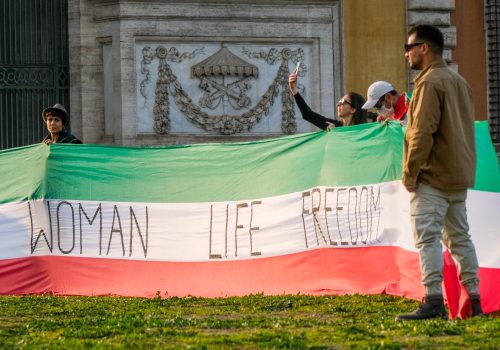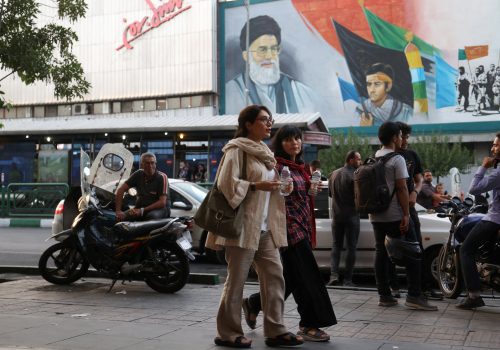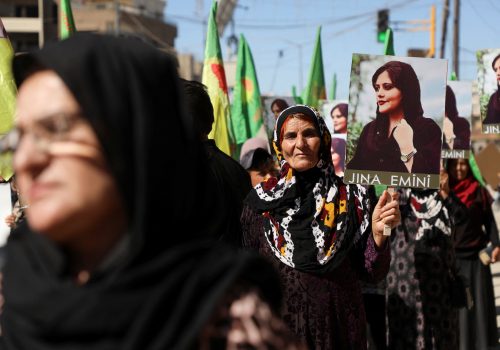If the West wants to support Iranian women, it must cut diplomatic ties with Tehran
The notorious morality police vans have returned to the streets of Iran—despite supposedly being suspended by Iranian authorities and being sanctioned by almost all Western countries—weeks before the anniversary of Mahsa Jina Amini’s murder. On September 16, 2022, news broke of the death of a twenty-two-year-old Kurdish woman who had been forcibly taken to one of those vans and fallen into a coma a few hours later. Her death—as a result of what happened to her at the hands of the morality police during those hours—triggered nationwide anti-regime protests. While many eagerly await another wave of protests in and around Amini’s death anniversary, it is time to evaluate the West’s response to the brutal crackdown on the ongoing protests known to many as the Woman, Life, Freedom revolution.
According to official numbers, thus far, over five hundred people have been killed, including seventy children, while thousands have been severely injured, including those who have been blinded or otherwise disabled. Additionally, tens of thousands have been detained, tortured, or enforcedly disappeared. Since the beginning of the year, the Islamic Republic has employed various tactics, such as the deliberate poisoning of schoolgirls and an increased use of the death penalty, to instill terror in the entire nation.
The moment the protests kicked off, the people of Iran asked for action from other states, particularly Western democracies. Although infighting and disagreements are rife within the Iranian community, they have been united in their demands for the West to cut diplomatic relations with the Islamic Republic.
What can the West do and continue to do in such a situation? From the perspective of those residing in Western democracies, the West has already fulfilled its role in addressing the aftermath of Amini’s death and the brutal crackdown on peaceful protests by imposing sanctions, travel bans, and freezing assets.
However, there are two further approaches the West can take short of military interference. The first is to take actions that incentivize a change of behavior. These would include, but are not limited to, human rights sanctions and United Nations (UN) mechanisms. The other, more impactful, approach would be to gradually delegitimize the oppressive government by cutting off diplomatic ties or boycotting them from political, sporting, and cultural events.
In the first few months of the protests, Iranians rejoiced over the fact that Western democracies were finally acknowledging their struggles. Germany pushed the European Union (EU) and the United Kingdom (UK) to reactivate their policies of human rights sanctions involving travel bans and asset freezes against perpetrators. Canada and Australia adopted human rights sanctions for the first time and the United States extended its sanctions lists. The UN Human Rights Council held a special session; with Germany and Iceland’s initiative, a UN Fact Finding Mechanism was established to investigate human rights violations relating to the protests, with special regard to women and children.
In October 2022, the German government updated its policy on Iran, cutting all business, cultural, and educational ties with the Islamic Republic. This was a step towards delegitimizing the clerical establishment. In the same vein, the EU and US suspended nuclear talks and Iran was removed from the UN Commission on the Status of Women (CSW). However, after global media lost interest in Iran’s protests when regime suppression suffocated local outcry, Western governments had no incentive to act.
No other country emulated Germany’s trailblazing policy, and the West has since stopped progressing toward delegitimization. Calls to close Iran’s embassies abroad and designate the Iranian Revolutionary Guard Corps (IRGC) as a terrorist organization by the EU and UK have been left unanswered. Western countries, especially those whose nationals were taken hostage in Iran—such as Sweden and Belgium—were pressured by the Islamic government to maintain diplomatic relations.
News of the exchange of a former Iranian diplomat, Assadollah Assadi, with a Belgian aid worker, whom the IRGC intelligence arm had detained, was a blow to those who risked their lives for freedom. Assadollah Assadi was sentenced to twenty years by a Belgian court for plotting terrorism on European soil. Following that, there were secret talks between the United States and Iran, which resulted in an agreement to release five Americans held in Iran in exchange for the US releasing billions of dollars in frozen Iranian assets. The manipulation of the UN system by the Islamic Republic, leading to its appointment to leadership roles in UN human rights mechanisms, while the international community remained largely stunned, inflicted another severe blow on the protestors.
Thus, it can be concluded that the West’s actions have been neither sufficient nor effective in changing the regime’s behavior.
Despite the odds, Iranian women and girls continue to fight at the forefront of a battle for bodily autonomy and freedom of choice. These courageous women and girls defy oppressive rules, enduring humiliation, verbal and physical attacks, expulsion from educational institutions and workplaces, and exclusion from various public spaces. They are denied access to public services, such as transportation, and businesses serving women without hijab can be fined or forced into closing.
The next wave of protests is on the horizon and will erupt sooner or later. It is the international community’s responsibility to support Iran’s people in their struggle and to remove the tyrannical regime that has ruled for over four decades once and for all. The international community must cease treating the Islamic Republic as a normal state and acknowledge it for what it truly is: a gender apartheid regime that neither can nor should represent the people of Iran when it actively discriminates, segregates, and persecutes women. This recognition comes with responsibilities similar to those embraced during the struggle against apartheid in South Africa.
The success of the Woman, Life, Freedom revolution relies on increasing the crackdown costs until the Islamic Republic’s grip on power falters, ultimately leading to its effective demise. Unlike what many think, the younger generation—Generation Z—who have been the leaders of this revolution are not asking for war or military interference. They only seek a total abandonment of all diplomatic ties with the Iranian government. Only through this approach will the West be able to gain the trust of the Iranian people and foster future relations in a democratic Iran. Meanwhile, it will serve as a deterrent against potential terrorist attacks on Western soil, considering the Islamic Republic’s well-documented propensity for such actions.
The people of Iran are ready. The ball is now in the court of the international community.
Shadi Sadr is a human rights lawyer and a member of the panel of judges at the International People’s Tribunals on Indonesia, Myanmar, and China. She co-founded and directed Justice for Iran, one of the organizers of the Iran Atrocities’ (Aban) Tribunal. Follow her on Twitter: @shadisadr.
Further reading
Thu, Feb 23, 2023
Iran’s ‘women, life, freedom’ revolution has a manifesto. Here are the next steps.
IranSource By
Signed by twenty organizations and released on February 13, the manifesto gathered the support of many civil society organizations in Iran.
Tue, Aug 15, 2023
Women in Iran fight to break Islamic Republic ‘cage’
IranSource By Khosro Sayeh Isfahani
“I will not return to that cage. I will not bow before bondage.”
Mon, Sep 26, 2022
‘Women, life, liberty’: Iran’s future is female
IranSource By
Women, young and old, have been at the forefront of the uprising, just like every other protest in Iran over the past decades.
Image: A young veiled Iranian woman holds a placard featuring cartoons of a veiled girl (L), and a girl who was not wearing the mandatory Hijab, during a rally in support of Hijab, and against women who do not wear the mandatory Hijab, in southern Tehran, July 12, 2023. Iranian protesters gathered at Imam Hossein Square to show their anger towards women who do not wear the mandatory Hijab on the first day of Hijab and Chastity. (Photo by Morteza Nikoubazl/NurPhoto)


